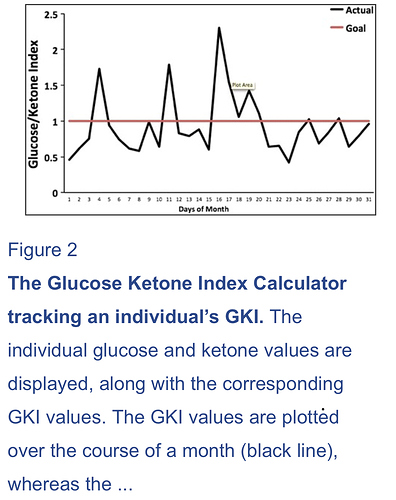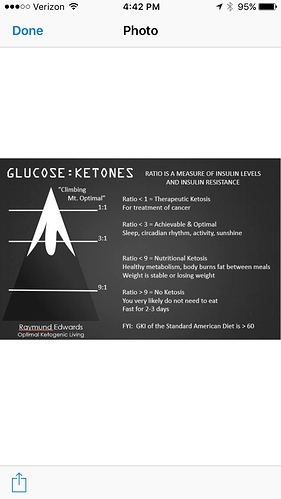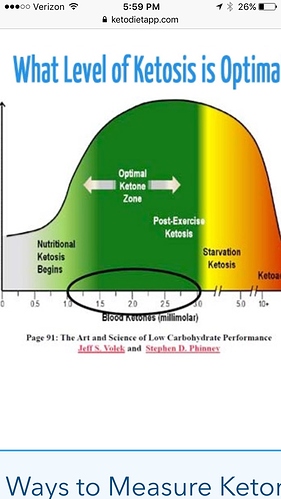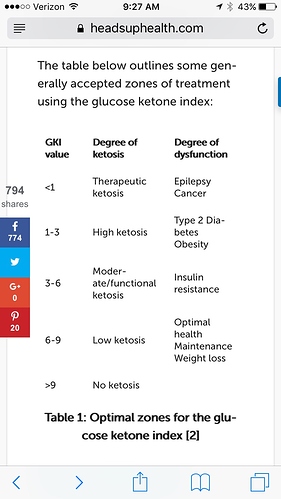There is only one aspect of this diet that I can’t figure out. Everyone says “don’t chase ketones” and “higher levels don’t mean better” but then those SAME people talk about “deeper” ketosis being better, or desiring more ketones, or what not. Why do people like Jimmy Moore and so many others want more ketones if it doesn’t matter? It seems to me it DOES matter to some degree, but I have no idea how or why
anyone? Why do people want more ketones? (other than severe medical issues)
The only thing that doesn't make sense to me
I’m really new to this, so this is just a guess. But you can “raise” your ketones by doing things like eating exogenous ketones (supplements). All it means is that you have put more ketones in your blood, and your reading will be higher, but your body hasn’t actually done anything to accomplish this, it really doesn’t mean anything. Maybe that’s what they mean by “chasing ketones”?
To add, that’s different from actually eating a diet that puts you in ketosis, which is when your body uses fat as fuel - ideally its own fat. (in other words, you lose weight). So if you’ve got a true rise in ketones, it should mean your body is burning fat really well.
I think that is subjective and maybe contextual, I would say it matters who you are talking about.
I also would say for most people it does not really matter all that much, the people having the hardest time adapting to fat are going to be the ones who are bouncing in and out of keto with low levels though, typically T2D and IR folks. Those folks need to track a little more closely, things like excessive protein or slightly above normal carbs can cause more issues with them since they have more insulin reaction than people less metabolically challenged.
Chasing ketones in of self is somewhat foolish IMHO you are stressing over someting that is not so easy to control, as well as taking exogenius ketones I view as foolish. I would rather know that things are working they way they should be more than any things else. Do monitor the levels, yes, do I care if they go up or down, no I am concerned if things are not working as they should.
I found this interesting -
One of the speakers at the Nutrition and Metabolism Society meeting in 2011 was Dr. Adam Hartman, who is an expert in the use of ketogenic for the control of epilepsy in children. He made an interesting comment on the timing of testing for ketones. When eating the typical mixture of foods that people normally consume in our society (a mix of proteins, carbohydrates and fats), ketones are highest in the morning. This makes sense because the least flow of carbohydrates in from the digestive tract is overnight, so the body burns some fat in the night. When eating a ketogenic diet, on the other hand, the most exposure to carbohydrates is overnight especially towards morning as the liver produces glucose to keep your brain fueled and to prepare you for getting up. Therefore, if you are eating a very ketogenic diet, the blood ketones go up during the day as you burn more fat for fuel.
If this hold true then levels of ketones would be determinate per the time of measurement with time being the variable.
Bottom line it’s about how much sugar your putting in your body and biome gut flora health? It is nice to take a peak\peek every once in a while (ketones fluctuate erratically) to see if your in Ketosis but it is also good to know what your blood sugars look like in contrast to ketone levels (GKI - Glucose Ketone Index Calculator, GKIC). The article below is more in reference to cancer and therapeutic Ketosis but you can derive a lot of information from it for whatever reasons you are choosing a ketogenic diet like optimal fat burning (physiologic fat cells) levels, fasting and autophagy etc. I personally like to use a glucose meter to get an idea of what glucose is compared to Ketones when I do eat for experimental purposes!
”…Having high levels of ketones doesn’t mean you’re automatically getting all of the benefits. *Luckily, research shows us that there’s an easy way to know if you’re in prime therapeutic mode so you can be confident you’re getting the best results.
Ketosis can already be complicated if you don’t test and figure out what kicks you out. Once you start getting serious about ketosis and tracking ketone levels, you can usually step things up a notch with a simple calculation. You can become more specific with what works for you as an individual. How you do that is by calculating your glucose ketone index.
The Glucose Ketone Index, or the GKI, is a ratio that researcher Dr. Thomas Seyfried has been using in his studies relating to both fasting and the ketogenic diet. There’s nothing fancy to this index, it is just a ratio of blood glucose levels to blood ketone levels.
Having high level of ketones are great and all, but if you also have a super high level of blood glucose, you’re really just spinning your wheels and not getting any benefits of ketosis. And the real key here is to make sure that the ratio between glucose and ketone levels is as low as possible.
If you’ve been following along, you’ll note I was pretty big on this glucose ketone index on my recent my four day fast and it actually dictated the time spent in the fast. But why did I care about this ratio, and why should you care?
WHY SHOULD YOU CARE?
Dr. Seyfried does a lot of his research in the realm of cancer treatment and has noticed increasingly impressive therapeutic outcomes with the lower the glucose ketone index ratio gets. Dr. Seyfried claims that a GKI of lower than 1.0 is prime therapy for patients with cancer, and he has plenty of data to back this up.
Note: No graph on website?
The graph above shows how tumor growth in his research is very clearly managed under a GKI of 1.0.
Some other examples from a publication of his research findings:
– 22% reduction in tumor metabolism going from 27.5 to 1.1 GKI for 56 days
– 88% reduction in tumor dry weight going from 15.2 to 3.7 GKI for 13 days
– 5x (!!!) survival time (41 days vs 200+ days) when combining radiation treatment and lowering from 32.3 to 5.7 GKI for only 13 days
This make a whole lot of sense when you think about it. Cancer cells survive on glucose. The more ketones and less glucose, the more they starve and the more they die. …” …More
Related:
The reason you do not want to chase ketones (by which I assume you mean keep consistently high numbers) is that you are simply measuring the amount in your blood (the amount produced but not yet used).
In the beginning of your ketogenic diet journey you body may overproduce (overcompensate) for the lack of carbs you suddenly have (maybe for the first time in your life).
Then, your ketone levels would measure high from the overproduction but also, since you are not adapted, maybe your body isn’t ready to use them as well as it should (still holding out for glucose).
But, your body is not stupid, it will want to become efficient - it will want to slow production as it becomes better at using ketones.
So, your ketone measurements will seem to drop as less get produced and more get used but, in fact, you are in a state of deeper ketosis as you now have this new efficiently running fat burning fuel system working full time.
I can’t explain why Jimmy Moore wants anything. And I can’t be bothered to care.
I say don’t chase ketones. Control Carbs. Prioritize Protein. Fill with Fat. That simple, that order. If you have T2DM, maybe your protein is lower. If you are building LBM while losing fat, maybe you want more protein and less fat. At no point do I have an F to give about my ketone level.
I might add that, if you had a condition, where ketone level might be the difference between health and death, such as having a large brain tumor, epilepsy, mild cognitive impairment, then it is likely worth your while to chase “therapeutic” ketosis. But if you are working on MetS diseases (T2DM, hypertension, NAFLD, central obesity, yada yada), or just losing weight, mental clarity, etc, chasing a higher level of ketosis is not worth your while.
Just a little anecdote to underline how unimportant it is to chase ketones - Dr. Andreas Eenfeld (dietdoctor.com) interviewed Matt and Megha from ketoconnect, and at the end they were chatting about ketone levels. Dr. Eenfeld said he and several other presenters at an lc/keto conference were comparing notes on their ketone levels one morning. They were ALL in the .5 to 1.0 range. No one was worried. 
I intend to never measure my ketones. Don’t have a meter. Won’t get one. I target 0 carbs, and come close. Since I am not dead (yet), I know I’m in nutritional ketosis. If I got a reading of x.xx - it wouldn’t change a thing. I just KCKO, KCFO and focus on feeling good, getting healthy, and never ever poisoning my body with carbs.
Done. And done.
I’m really enjoying reading these posts. I listen to a lot of podcasts on keto other than this one, and they do talk about “higher levels of ketones” even after they say it doesn’t matter. It seems to matter to them despite what they say butI love the “give zero sh^&ts” attitude about it, because that’s what I really want to do.
People chase ketones like an obsession, they are children. If your goal with keto is fat loss, health, battling IR etc its pointless. People end up stuffing their face with fat to reach these mystical numbers that mean nothing unless you need keto for therapeutic reasons.
It is like using a scale to gauge your “fat” loss… scales measure weight, not fat and scale #'s can fluctuate on an hourly basis.
My concern with the Glucose Ketone Index is for many of us long term keto people who have high BG readings because of Physiological Insulin Resistance, dawn phenomenon etc such that these readings will be pretty messed up and not a a real way to gauge the GKI.
I don’t know as much as many on this thread, so take this for what it’s worth, but my IDM coach advised me that a range of 1-3 blood ketones will optimize my weight loss and effort toward restoring metabolic health. I think the notion is that because insulin and ketones trend in a “seesaw” balance, better ketones can be an indicator that you are keeping your insulin down, especially when balanced by comparison to blood glucose numbers, which can be low if insulin spikes for many of us with metabolic syndrome.
These charts, from pretty respectable experts in the field convinced me that this metric may matter and helped me to make sense of the numbers:
That said, I agree that taking exogenous ketones doesn’t seem to be of benefit in the quest for metabolic health, and certainly not if it’s substituting for eating a clean ketogenic diet. Yet I’ll repeat my previous disclaimer: I’m an English teacher, not a scientist, but seeking to learn more to reclaim my health every day.
As I see it, ketones are a by product of metabolic healing. Taking exogenous ketones would be like wearing a muscle print T-shirt and pretending to be Schwarzenegger!
It would be more accurate to say that:
blood ketone levels are not a reliable indicator of fat loss…
because
blood ketone levels are only an indicator of the amount of ketones in the blood
however
breath acetone is a reliable measurement of fat burning because it is a by-product of the fat burning process
https://onlinelibrary.wiley.com/doi/abs/10.1002/oby.21242
Anderson-2015-Obesity.pdf (271.8 KB)




